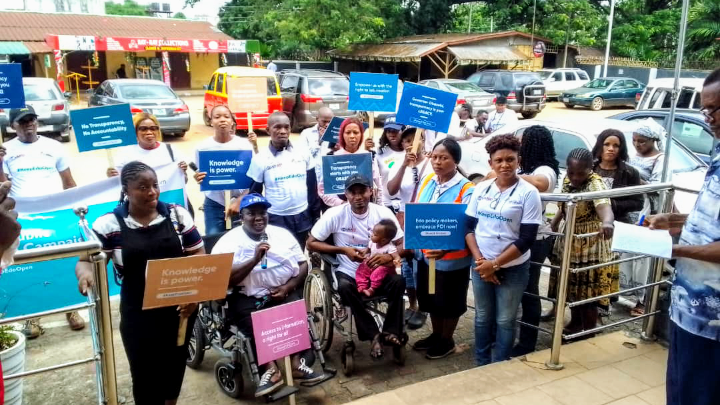A group Civil Society Organisations (CSOs) led by the Conference of Non-Governmental Organizations (CONGOs) in conjunction with ResearcherNG, has tasked the Edo State Governor, Mr. Godwin Obaseki to enact the Freedom of Information Act (FOI) Law in the state to engender transparency and accountability in governance.
The group in a sensitization rally to the premises of the Edo State House of Assembly (EDHA) and the secretariat of the Nigeria Union of Journalists (NUJ) Edo State Council, noted that the rally has become necessary because the citizens have rights to seek for information and should not be hindered.
Speaking on behalf of the group at the premises of the Edo State House of Assembly, the Policy and Governance Advocacy Officer ResearcherNG, Modupe Akinwale, said if the FOI Law is passed in the state, it will enhance the people’s access to government information and promote accountability and good governance.
“We are agitating for the domestication of the Freedom of Information Act”.
“We started our campaign from the King Square and this is not a fight for the civil society organizations alone. It is a fight for all citizens and most especially, media organizations, as it is also going to help them access information”, Akinwale said.
Addressing the group, the Special Adviser to the Speaker on Media Mrs. Ivy Ebojele said the Edo 8th Assembly is a grass rooted assembly; an assembly of people who have the interest of Edo State at heart.
According to her, “Freedom of Information is what we all need. As your group has come, you need to do a petition or a write up. With that, whatever will be done would be based on your needs and aspirations, because we all know we need access to information and this Freedom of Information Act supposed to have been domesticated a long time ago, and I know this issue has come up often. So, may be this is the time for it to be domesticated,” she said.
Addressing journalists at the Edo State NUJ secretariat, Chairman, Joint National Association of Persons With Disabilities, Edo State, Comrade Ann Ojugo, said that it is worrisome that since the Freedom of Information Bill became an Act, is still not domesticated in Edo State.

While calling on NUJ to lend their voice to the call for the enactment of the FOI Law in the state, Ujugo said when passed into law FOI will enable citizens to hold the government of the day accountable to the citizens.
“The FOIA has been passed at the national level but in Edo State, it has not been domesticated.
“The Freedom of Information Act will place everyone on the same page and to know what the government is doing in Nigeria, what we need to know, the good effects of the governance, and what we also need to add to it if the government is not working well.
“Any society that is not informed, will be deformed. That is why this morning, we deemed it fit to come to this NUJ Press Centre to air our minds and views for you to lend your voice.
“That is why we have come to solicit that you should also lend your voice so that the Freedom of Information Act will be domesticated in Edo State”, Ojugo said.
Speaking also, the Policy and Governance Advocacy Officer ResearcherNG, Modupe Akinwale, said that if the FOIA is domesticated in the state, it will befit all, including the media practitioners.
“We are agitating for the domestication of the Freedom of Information Act.
“We started our campaign from the king square and we have also been to the state house of assembly where we had the Special Adviser to the speaker on Media advised us.
“We have also been asked to write them a letter and also sent draft bills for them to take action. So, as a leader when it comes to the media in Edo State, we are certain that you are in support of this advocacy as knowledge is power.
“And this is not a fight for the civil society organizations alone. It is a fight for all. Citizens and most especially, media organizations. As it also going to help them access information”, Akinwale said.
Responding, the leadership of the Nigeria Union of Journalists, Edo State chapter commended the group for advocating for its domestication in the state, noting that when it is actually domesticated, it will promote transparency in governance.
Discover more from DE-PATRIOT
Subscribe to get the latest posts sent to your email.
